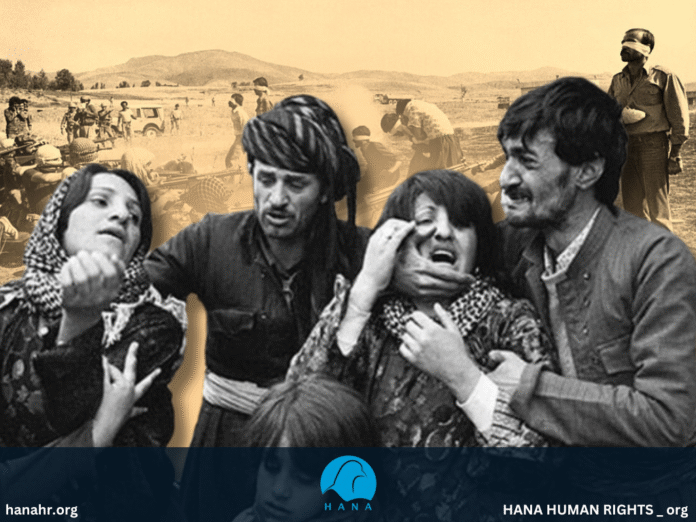On 19 August 1979, Ayatollah Ruhollah Khomeini issued a religious decree (fatwa) ordering Iranian military and paramilitary forces to suppress political opposition in Iranian Kurdistan. The fatwa came in the wake of a deepening crisis: Kurdish political parties and communities had rejected the Islamic Republic’s constitutional referendum, and peace talks between Kurdish representatives and the new central government had collapsed. Citing the principle of legitimate self-defense, Kurdish groups began resisting the state’s escalating military incursions. Their organized, asymmetrical tactics led to the temporary withdrawal of government forces from several major Kurdish cities. In response, Khomeini publicly called for what he described as a jihad against the “evildoers” in Kurdistan.
What followed was a full-scale, state-led military campaign involving the Iranian Army, the Islamic Revolutionary Guard Corps (IRGC), the Gendarmerie, and local paramilitary units, supported by aerial bombardment. Khomeini’s order, delivered after reciting verse 48:29 of the Qur’an, stated: “I strictly order the Chief of Staff of the Army, the Commander-in-Chief of the Islamic Gendarmerie, and the Head of the Islamic Revolutionary Guards to instruct the forces dispatched to the Kurdistan region to pursue the evildoers and aggressors attempting to flee, to arrest them and urgently hand them over to the competent courts, and to immediately close all regional borders to prevent their escape. I also strictly order the arrest and surrender of the leaders of the evildoers with full force. Any negligence in this matter will be deemed a dereliction of duty and will result in severe accountability.”
Although expressed in religious terms, the fatwa functioned as a military order. As Supreme Leader and Commander-in-Chief, Khomeini’s decree carried full executive and military authority. At the time, commanders across Iran’s armed forces operated under a centralized chain of command and were effectively bound to carry out such orders. The campaign that ensued was marked by widespread and systematic human rights violations across Kurdish cities and rural areas. Independent documentation remains limited due to the Islamic Republic’s long-standing restrictions on foreign media and refusal to permit international investigations. Nevertheless, existing evidence from credible sources—including survivor testimonies, Kurdish archives, and a 2008 Amnesty International report—provides a consistent record of atrocities. Villages and towns were bombarded and destroyed. Entire civilian populations, such as those in Qarna and Qalatan, were reportedly massacred. Peshmerga fighters, many of them unarmed local volunteers, were captured and executed extrajudicially without access to due process. In cities like Sanandaj and Mahabad, prolonged sieges by government forces deliberately cut off food, water, and medical supplies, leading to starvation and forced displacement of civilians. Estimates suggest that at least 10,000 Kurdish civilians were killed during the course of these operations.
These acts may constitute serious crimes under international law. According to Articles 7 and 8 of the Rome Statute of the International Criminal Court, the documented conduct meets the threshold for both crimes against humanity—including widespread or systematic attacks against civilians—and war crimes, including unlawful killings, the destruction of civilian property, starvation as a method of warfare, and the targeting of non-combatants. The principle of command responsibility further applies, given the centralized structure of the operations and the high-level coordination under Khomeini’s authority. Despite the gravity of these crimes, no investigation or prosecution has taken place.
To this day, those involved in commanding roles have remained in high-ranking military and political positions. The Islamic Republic of Iran has never formally acknowledged the 1979 fatwa or the crimes that followed. No reparations have been made to survivors, and no judicial body—national or international—has addressed the events. Even among elements of the opposition, these atrocities remain largely absent from the narrative, contributing to a broader culture of historical erasure and entrenched impunity. This silence is not only a denial of justice—it is an obstacle to healing, truth, and meaningful non-recurrence.
Hana Human Rights Organization calls on the international community, including United Nations human rights mechanisms, to break that silence. We urge states and institutions to publicly recognize the 1979 military campaign in Kurdistan as a case involving serious violations of international humanitarian and criminal law. We call for the establishment of an independent international truth commission to investigate and document the events, to preserve evidence and survivor testimonies, and to identify possible avenues for legal accountability. We further call on international legal actors and civil society to support Kurdish survivors and victims’ families in their pursuit of justice, truth, and reparations—including through universal jurisdiction mechanisms where applicable. Hana’s Legal Office in Geneva has launched a documentation initiative to collect testimonies, archival material, and legal evidence relating to the 1979 campaign. We welcome collaboration with international legal experts, transitional justice institutions, and human rights organizations committed to addressing this long-ignored chapter in Kurdish history. Justice delayed does not mean justice denied—but recognition is the first step toward accountability, and accountability is the foundation of non-repetition.
Hana Human Rights Organization – Legal Office Geneva, Switzerland 6 August 2025

